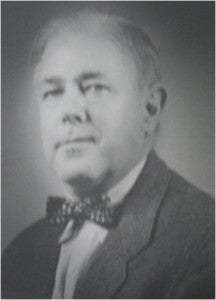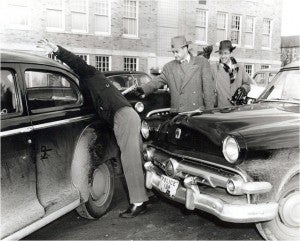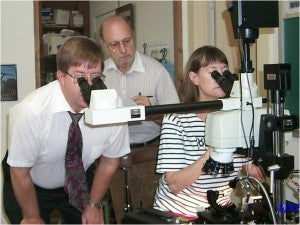The Rhode Island State Crime Laboratory had its beginnings in 1949 with the arrival of Dr. Harold C. Harrison at the University of Rhode Island’s Department of Chemistry. Dr. Harrison had a passion for applying science to police investigations. He first offered his expertise, to the South Kingstown Police Department, in a breaking and entering case in which he matched glass from a store-front window to samples of glass found in the pant-leg cuffs of a suspect.

Dr. Harrison’s unique interest developed into “The Laboratories for Scientific Criminal Investigation”, where he provided his expertise to law enforcement throughout the New England area. In 1952, Dr. Harrison began teaching law enforcement officers the “how to” aspect of scientific criminal investigations. In 1953, twenty-eight of Rhode Island’s “Top” Police Officers graduated from that program. The Attorney General, in 1958, officially acknowledged the Laboratory as a valuable resource to the criminal justice system.
While working at the University as both a Professor of Chemistry and the Assistant Director of the Laboratory, Dr. Harrison developed many contacts with other faculty. He sought assistance from colleagues in many cases. Two key contacts were Dr. Heber Youngken, Dean of the College of Pharmacy and Dr. David R. DeFanti, a professor of Pharmacology and Toxicology.

In 1969, Dr. Harrison suffered a stroke and died a few days later. At that time, Dean Youngken proposed shifting the Laboratory from the Chemistry Department to the College of Pharmacy. Dean Youngken became Director in 1970 and Dr. DeFanti became the Assistant Director. In 1971, Dr. DeFanti became the Director of the Laboratory. The Laboratory by this time was operating under grants from the Law Enforcement Assistance Administration (LEAA). Dr. DeFanti hired a full-time examiner for trace evidence examination.
With the elimination of the LEAA grants, which the Laboratory had relied upon for funding, legislation enacted in 1978 created a State Crime Laboratory Commission and the State Crime Laboratory at the University of Rhode Island.
In 1980, the State of Rhode Island, through the Department of the Attorney General, received a grant from the Federal Government to improve the prosecution of arson cases. This provided the laboratory an opportunity to purchase new equipment to examine this type of evidence and to add a third examiner to the staff.

In 1992, Dennis C. Hilliard became Acting Director/Adjunct Assistant Professor of the Rhode Island State Crime Laboratory (RISCL). In 1995, he became Director/Adjunct Assistant Professor of the RISCL and to date is the current Director of the Laboratory. As the need for additional forensic services increased, along with the state’s population, the RISCL has grown. Currently, the RISCL employs 9 scientists and support staff. These dedicated professionals perform scientific testing and services on several thousand exhibits each year.
